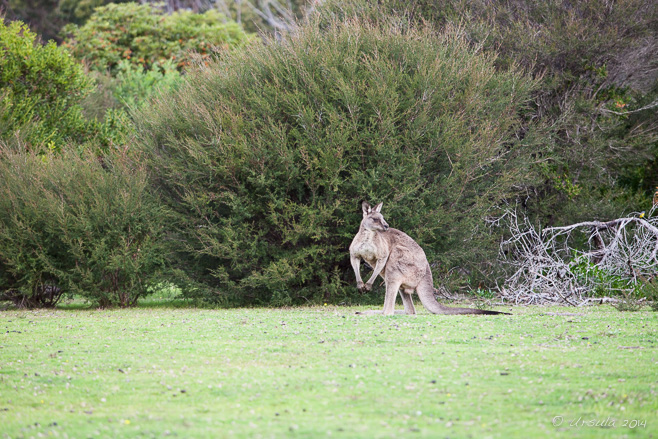
Eastern Grey Kangaroo – Macropus Giganteus
In the grassy flats north of Haycock Point, a male grey looks around, showing off his powerful shoulders.
I am a stranger to my own neighbourhood.
Since “repatriating” to Australia from Asia almost three years ago, my husband and I seem to have spent very little time in the country. And, as our family and friends live a long way from our home, much of the time we do spend in the country is spent in the car, in hotels, and/or in other people’s homes.
As much as I love walking, during those brief intervals when I am at home, I get caught up in the day-to-day, or spend my time sitting on my balcony watching the birds on the estuary. I don’t get out to explore nearly often enough.
So, it is a real treat when one of our short home-stays coincides with a good excuse to go for a ramble around our little corner of the world. The local National Parks Association chapter only facilitates regional walks every two months, but last May the dates lined up for us and we joined a small group of hikers in the north end of Boyd National Park, NSW for the easy 6km return walk from Haycock Point to Barmouth Beach.
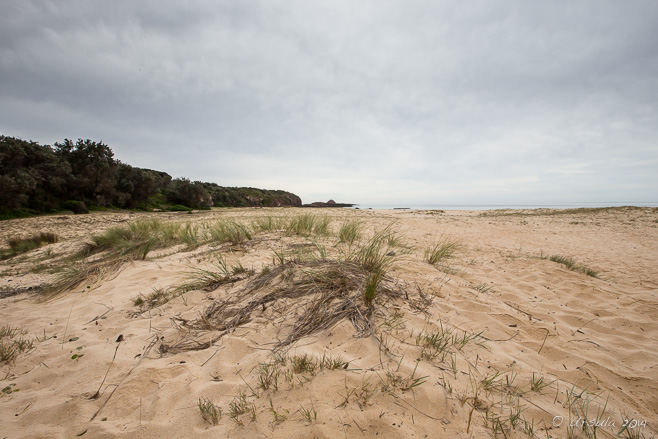
Beach at Haycock Point
Overcast skies greet us at the beach off the Haycock Point picnic area as we wait to start our walk.
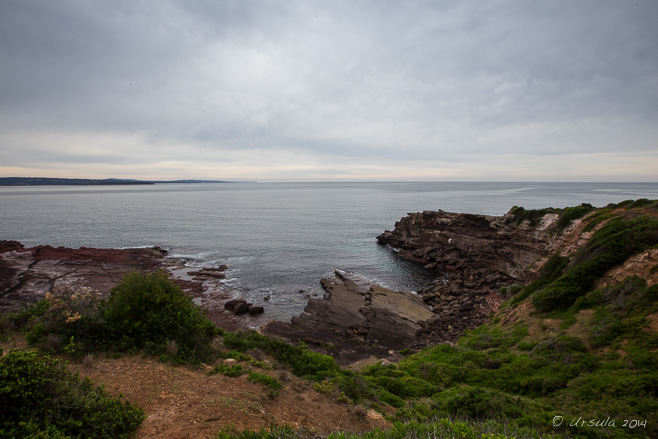
Rocky Red
The rugged coastline of folded Devonian strata at Haycock Point juts into the Tasman Sea.

Cormorants
Birds sit on the rocks, red with iron, and watch the water.

Scarlet Robin
Keep your eyes sharp!

Scarlet Robin
The local birds can be hard to spot in the native bush.

Waters off Haycock Point
A small patch of blue appears in the waters off the cliff. Maybe the skies are lifting?

North to Barmouth Beach
The walkers head north, into the scrubby woodland leading away from Haycock Point.

Gumnut Flowers
The woollybutt (eucalyptus longifolia) trees are in bloom around us.

Not-So-Delicate Bush
Clumps of delicate-looking drooping she-oak (Allocasuarina verticillata) bushes sit on the wind-swept grassy plains.

Red Rocks
As the track rejoins the coast, we get another view of the red rocks to the south…

Arched Rock
… and of an unnamed rock arch to the north.

Wild Berries
The Australian mock orange trees (Pittosporum undulatum) are heavy with small fruit.

Barmouth Beach
The beach at the mouth of the Pambula River comes into view through the trees.

On the Water
Kayakers take advantage of the calm, if overcast, conditions.

Red Rocks on Barmouth Beach
Iron-rich rocks resist the erosion that has carved out this dramatic shoreline.

Sand and Rocks on Barmouth Beach

The Brightness of Water
Waves splash against the rocks on the shore as we eat our lunch on Barmouth Beach, the end-point of our walk.

Barmouth Beach
George Bass, British naval surgeon and explorer of Australia, first landed at Barmouth Beach in December 1797 to shelter from a gale.

Colours of Barmouth Beach
According to the NSW National Parks Service, George Bass “marvelled” at the beauty of this area as he explored up into the Pambula River.

Pambula Across the Water
As we work our way back from Barmouth Beach, the sun breaks through the clouds.

Swamp Harrier
We thought this was a sea eagle, as we watched it and its mate high in the treetops – but I’m pretty sure its another raptor: a swamp harrier (Circus approximates).

Eastern Grey
With effortless grace, a kangaroo we startled bounded off across a grassy flat.

Eastern Greys
Two other roos keep a watchful eye on us.

Watchful Wallaby
In a near by grassy patch, a swamp wallaby (wallabia bicolor) grazes.

Haystack Rock
The wreck of the SS Empire Gladstone sits under the waters here. It struck rocks and sank in 1950 after mistaking the lights of the nearby town of Merimbula for a lighthouse.

Coastal Banksia – Banksia Integrifolia
Tangled banksia greets us as we reach the car park near the Haycock Point picnic area…

Kookaburras – Dacelo
… and kookaburras laugh overhead as we enjoy our post-walk coffee.

All in all, a pretty typical day in the Aussie bush.
Until next time ~
Happy Rambles!
Pictures: 18May2014


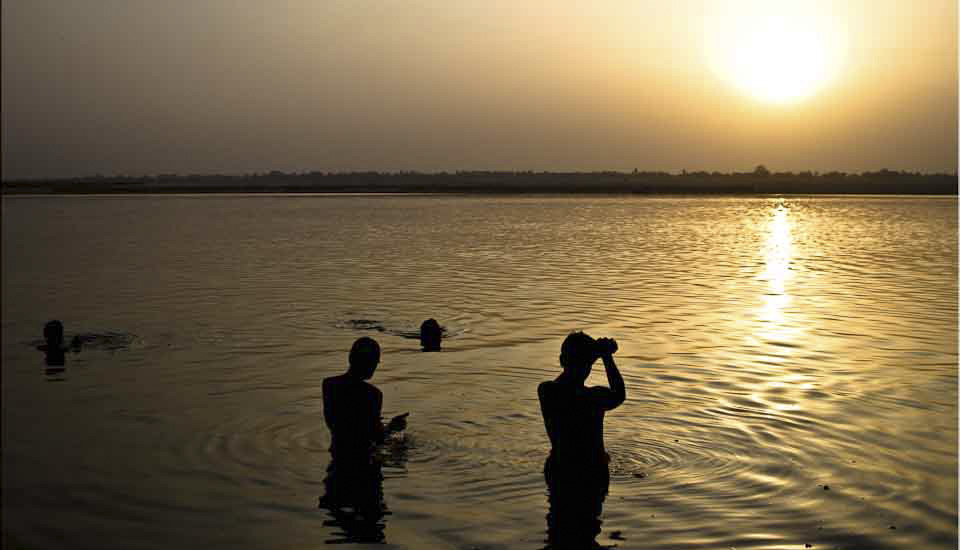




























.png)

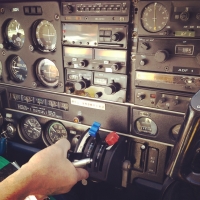
Hi Ursula
Thanks for the wonderful pics – I missed the walk but now feel that I have seen the highlights! The “not so delicate bush” is Allocasuarina verticillata and the flowering gum is Eucalyptus longifolia
Regards
Doug
Thanks, Doug!
And thanks for the info on trees – I’ve updated the text accordingly. 😀
[…] done this walk before (see: In the Aussie Bush), but what amazes me when I looked back over the pictures from both visits, is how many differences […]